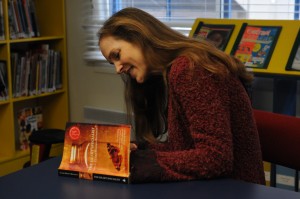 This week we welcomed Claire Holden Rothman, author of this year’s LCC Reads book The Heart Specialist as well as Dr. Ariane Marelli, Director of the MAUDE Cardiology Unit at the Montreal General Hospital (Lib_LCCReadsAssembly_01Dec2011). In the spirit of discussing this book, I put together my own Top Ten list about the importance of reading (view LCC Reads photos).
This week we welcomed Claire Holden Rothman, author of this year’s LCC Reads book The Heart Specialist as well as Dr. Ariane Marelli, Director of the MAUDE Cardiology Unit at the Montreal General Hospital (Lib_LCCReadsAssembly_01Dec2011). In the spirit of discussing this book, I put together my own Top Ten list about the importance of reading (view LCC Reads photos).
1. Academic Success – Research confirms that the greatest single predictor of success in senior high school and post-secondary programs is the capacity of a student to read. Reading builds knowledge and makes students smarter.
2. Vocabulary Development – Reading helps put words in context and broadens our word recognition ability.
3. Imagination – Reading takes us to new and imaginary places and helps us to be more creative; it certainly helps develop more colourful ideas.
4. Quiet and Calm – The opportunity to quietly pause and focus in a busy/noisy world is an important attribute of focusing on a text.
5. Storytelling – Storytelling is so powerful that many ancient cultures continue to stress key stories as the foundations of their cultural identity. This remains the case with many aboriginal nations in Canada. Consider also how in mainstream culture the Harry Potter series excited and engaged a whole generation of young people. The release of every new book in the series caused pandemonium around the world.
6. Choice – Read whatever interests motivates or excites you. Whatever makes you think and develop original ideas, develop solutions to problems, or create a greater awareness of the complexities of the world is meaningful. Reading can actually lead to discoveries and have a “wow factor” that motivates us to achieve.
7. Inspiration – Martin Luther King’s “I have a dream” speech, John F. Kennedy’s inaugural address “Ask not what this country can do for you, ask what you can do for your country,” Nelson Mandela’s inaugural address as the first black President of South Africa… these are all examples of how the written word can awaken deep feelings in all of us. Also, stories of courage can motivate us and the written word presents the opportunity for a clear voice by people who are somewhat shy in groups and less inclined to speak out.
8. Meaningful – In our Junior School we use an active reading methodology called “AIM” which focuses on students’ meaningful personal connections to texts. While students are quietly reading they employ gestures that indicate what the material makes them feel, think, predict, connect and remind them of. Each sentiment has a quiet gesture. One-on-one, the classroom teacher listens to the student’s oral explanation of why something is personally meaningful. In short, the reading material becomes more relevant – and young students become more actively connected to the content.
9. Power of Words – Words resonate deeply. Remember that two winters ago Canada’s Olympic team chose a simple word to motivate our athletes and a whole nation – “Believe.” It was Canada’s mantra, “Believe.” The word inspired athletes, teams, and a whole country as we earned the greatest medal haul in our history.
10. Reading Builds Community – We begin young by reading some common texts/stories in school and continue to share stories in English classes in high school. Beyond school, book clubs are very popular in Canada (at LCC as well at various levels). Our LCC Reads program has helped to bring hundreds of people together over a single book.
Thanks to all of our English teachers for their support of reading and literacy skills here at LCC. A special thank you to Mr. Moore, Head of our English department and co-chair of the LCC Reads committee, along with our chief librarian Mrs. Varvarikos and dozens of students who are active members of our LCC Reads Club. Continue to read, learn and be inspired by the written word. Remember, literacy is timeless!– Christopher Shannon, Headmaster

